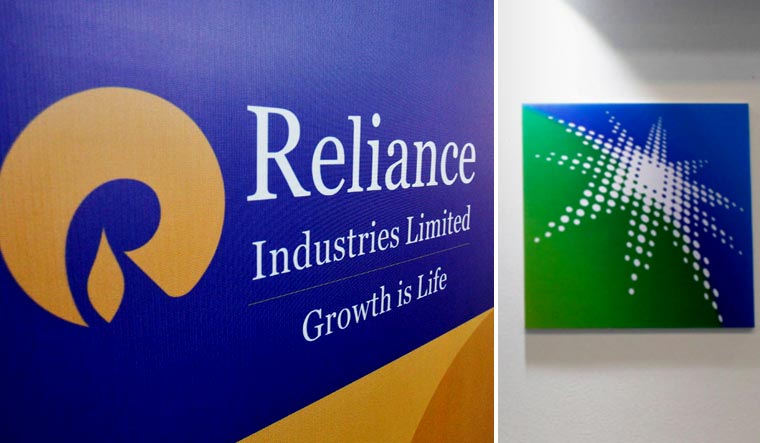At Reliance Industries' annual general meeting in 2019, Chairman Mukesh Ambani made a big announcement that Saudi Arabian oil giant Aramco would acquire a 20 per cent stake in RIL’s oil-to-chemicals (O2C) business. Had the deal gone through then, it would have been one of India’s largest foreign direct investments.
However, the COVID-19 pandemic hit in 2020 and as fuel demand declined sharply with people working from home and travel curbed, oil prices crashed. So, the RIL-Aramco negotiations got delayed. With the global economy on the recovery path and oil prices also gaining ground (up 35 per cent this year), the deal has been back on the radar in 2021.
“Despite several challenges due to COVID-19, we have made substantial progress in the past year in our discussions. These discussions have been held in the spirit of mutual commitment to convert our long-standing relationship into a perpetual partnership,” Mukesh Ambani, the chairman of RIL, told shareholders at the AGM this year.
He said the partnership was expected to be formalised in an “expeditious” manner during the year, after acquiring required regulatory clearances. A recent Bloomberg report had suggested talks were at an advanced stage and a deal could be reached in coming weeks. Aramco could be looking at a 20 per cent stake in RIL’s O2C business, for $20-25 billion in Aramco shares, the report said. So, in addition to RIL getting a strong partner and funds in its O2C business, it will also get 1 per cent stake in the world’s biggest oil producer.
At the RIL AGM this year, Aramco’s chairman Yasir Al-Rumayyan was also appointed as an independent director on RIL’s board.
The appointment was important considering that Al-Rumayyan is also the Governor of the Public Investment Fund, Saudi Arabia’s sovereign wealth fund and one of the world’s largest. It is already a big investor in RIL, pumping close to $1.5 billion into Jio Platforms last year.
Not surprisingly, these developments indicate the importance of the deal for both the parties. Crude oil prices tend to be volatile. While COVID-19 pandemic had a big impact and led to an oil price slump, geo-political tensions in West Asia have also had an adverse impact on oil prices as well as supplies in recent years. Getting a partner like Aramco on board will help RIL cement assured and constant crude oil supplies for a long term. This will benefit its refining operations as well as its petrochemicals business, where crude oil is a key raw material.
The partnership with Aramco could give RIL a leg up in the fuel-retailing business, too. Aramco already has a fuel retailing JV with Sinopec in China, which operates over 1,000 outlets. Aramco also has an equity stake in China’s O2C project in Zhejiang.
Analysts have said in the past that a similar footprint is possible in India, too. RIL operates a fuel retailing joint venture with British energy giant BP and a partner like Aramco, which guarantees crude supplies is a big advantage.
World over, renewable energy is gaining traction and seeing big opportunities here, RIL too, has announced huge investments in the new energy business. Over the next three years, RIL will be investing more than Rs 60,000 crore in scaling up the new energy business, which will include four giga factories that will manufacture critical components for the new energy ecosystem.
So, as RIL channels its finances towards new energy, Aramco’s backing will continue to fuel its O2C business, which still accounts for a large chunk of its earnings, despite its huge investments in retail and telecom in the last few years.
In the April-June quarter, for instance, revenue from RIL’s O2C business stood at Rs 103,212 crore, while O2C EBITDA (earnings before interest, taxes, depreciation and amortization) was at Rs 12,231 crore.
also read
- 2024 year-ender: Here are the top 10 most valued firms in India
- Oil prices enter a tipping zone: Good news for India?
- Jiohotstar domain row: JioCinema-Hotstar OTT streaming platform to be called ‘JioStar’?
- What is Karan Johar's net worth? 'Jigra' producer creates buzz over Dharma Productions' X bio amid Reliance takeover talks
Despite the impact COVID-19 has had on India, the economy is still one of the fastest growing and the GDP is expected to top $5 trillion in the next few years. At a time the pandemic impacted its earnings, a deal with RIL will help Aramco supply 5 lakh barrels per day of crude to the Jamnagar refinery. A large part of India’s oil imports are from the OPEC (Organisation of Petroleum Exporting Countries) block, which also includes Saudi Arabia. Through the RIL deal, Aramco will get to strengthen its business with India at a time demand for petroleum products, especially in the developed world, is expected to decline in the coming years as electric and hybrid vehicles get traction.
So, a deal between RIL and Aramco is a win-win for both the parties. The deal, when first announced in 2019, was valued at $15 billion. A lot has changed since from a demand and supply perspective due to the pandemic. RIL’s shares have also rallied over 71 per cent since August 2019. So all eyes will now be on how the deal is structured. At what price is RIL’s O2C business being valued at will also be key.





